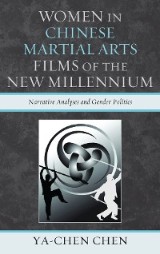Details

Women in Chinese Martial Arts Films of the New Millennium
Narrative Analyses and Gender Politics|
119,99 € |
|
| Verlag: | Lexington Books |
| Format: | EPUB |
| Veröffentl.: | 12.04.2012 |
| ISBN/EAN: | 9780739139103 |
| Sprache: | englisch |
| Anzahl Seiten: | 294 |
DRM-geschütztes eBook, Sie benötigen z.B. Adobe Digital Editions und eine Adobe ID zum Lesen.
Beschreibungen
<span><span><span>Women and Gender in Chinese Martial Arts Films of the New Millennium</span><span>, by Ya-chen Chen, is an excavation of underexposed gender issues focusing mainly on contradictory and troubled feminism in the film narratives. In the cinematic world of martial arts films, one can easily find representations of women of Ancient China released from the constraints of patriarchal social order to revel in a dreamlike space of their own. They can develop themselves, protect themselves, and even defeat or conquer men. This world not only frees women from the convention of foot-binding, but it also "unbinds" them in terms of education, critical thinking, talent, ambition, opportunities to socialize with different men, and the freedom or right to both choose their spouse and decide their own fate. Chen calls this phenomenon "Chinese cinematic martial arts feminism." </span></span><br><span></span><br><span><span>The liberation is never sustaining or complete, however; Chen reveals the presence of a glass ceiling marking the maximal exercise of feminism and women's rights which the patriarchal order is willing to accept. As such, these films are not to be seen as celebrations of feminist liberation, but as enunciations of the patriarchal authority that suffuses "Chinese cinematic martial arts feminism." The film narratives under examination include </span><span>Crouching Tiger, Hidden Dragon</span><span> (directed by Ang Lee); </span><span>Hero </span><span>(Zhang Yimou); </span><span>House of the Flying Daggers</span><span> (Zhang Yimou); </span><span>Seven Swords </span><span>(Tsui Hark); </span><span>The Promise</span><span> (Chen Kaige); </span><span>The Banquet</span><span> (Feng Xiaogang); and </span><span>Curst of the Golden Flower</span><span> (Zhang Yimou). Chen also touches upon the plots of two of the earliest award-winning Chinese martial arts films, </span><span>A Touch of Zen</span><span> and </span><span>Legend of the Mountain</span><span>, both directed by King Hu.</span></span><br><span></span></span>
<span><span><span>Women and Gender in Chinese Martial Arts Films of the New Millennium</span><span>, by Ya-chen Chen, examines underexposed gender issues in more recent films, focusing on the contradictory feminism in the film narratives. Through the lens of Chinese martial arts films, Chen delves into "Chinese cinematic martial arts feminism," highlighting the glass ceiling which marks the maximal exercise of feminism which the patriarchal order is willing to accept.</span></span><br><span></span></span>
<span><span><span>Introduction. Towards Social-Cultural and Historical Readings: "Chinese Cinematic Martial Arts Feminism" and Its Limitation in the narrative of Martial Arts Films</span></span><br><span><span>Part 1. Narrative Analyses of Women and Gender Concerns in Every Film</span></span><br><span><span>Chapter 1. The Fox, Dragon, and Lotus in </span><span>Crouching Tiger Hidden Dragon</span></span><br><span><span>Chapter 2. To (En)gender the Gendered History in </span><span>Hero</span></span><br><span><span>Chapter 3. There is a Beauty in the Door(way) of Flying Daggers</span></span><br><span><span>Chapter 4. Women Who Do Not Practice Martial Arts in </span><span>Seven Swords</span></span><br><span><span>Chapter 5. Cinderella, Snow White, and Sleeping Beauty in </span><span>The Promise</span></span><br><span><span>Chapter 6. The Chinese Hamlet's Two Women and Shakespeare's Chinese Sisters: Qing Nü and Wan'er in </span><span>The Banque</span></span><br><span><span>Chapter 7. Traffic of Madwomen in the Chinese Royal Attic: Gender Concerns in </span><span>Curse of the Golden Flower</span></span><br><span><span>Part 2. Integrated Analyses about the Limitation of Feminist Emancipation in Groups of Films</span></span><br><span><span>Chapter 8. Let's Make a Wish: Martial Arts Ladies' Wishes under the Cinematic Pen(is) from </span><span>A Touch of Zen</span><span> to </span><span>Crouching Tiger Hidden Dragon</span><span>, </span><span>Hero</span><span>, </span><span>House of Flying Daggers</span><span>, and </span><span>The Promise</span></span><br><span><span>Chapter 9. Phallocentric Teacher-Student Complex: From </span><span>Legend of the Mountain</span><span>, </span><span>Crouching Tiger Hidden Dragon</span><span>, and </span><span>Hero</span><span> to </span><span>Seven Swords</span></span><br><span><span>Chapter 10. A Chinese Cinematic Martial Arts Room of Pygmalion's Own</span></span><br><span><span>Part 3. Interviews</span></span><br><span><span>Chapter 11. Interview with Chung Ling, King Hu's Spouse and Screenwriter</span></span><br><span><span>Chapter 12. Interview with Pan Hua, a Female Classmate and Peer-Director of Zhang Yimou, Chen Kaige, Tian Zhuangzhuang, Wu Ziniu, Li Shaohong, Hu Mei, and Peng Xiaolian</span></span><br><span><span>Chapter 13. Interview with Tsai Kuo-jung, a Co-planner and Screenwriter of Ang Lee's </span><span>Crouching Tiger Hidden Dragon</span></span><br><span><span>Chapter 14. Interview with Wang Wei, a Judge in the Golden Horse Film Festival</span></span></span>
<span><span><span>Ya-chen Chen</span><span> is an assistant professor of foreign languages and literature, and director of the Chinese Language Program at Clark University. </span></span><br><span></span></span>

















